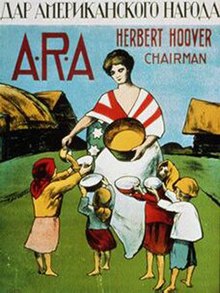Edmund A. Walsh
[19] In 1922, while studying political science, Walsh received appointment as Catholic representative to the American Relief Administration, also known as the "Hoover Mission", during the Russian famine of 1921.Walsh began friendships and close collaboration in famine relief work with the main leaders of the Catholic Church in Russia; Archbishop Jan Cieplak, Monsignor Konstanty Budkiewicz, and Exarch Leonid Feodorov.Walsh and the first Exarch of the Russian Greek Catholic Church first met one another and conversed in Ecclesiastical Latin, Feodorov, who admired Patriarch Tikhon and his followers and felt only contempt for the so-called Living Church, urged that the Famine Relief food supplies be entrusted not only to Catholic clergy, but also to those Russian Orthodox priests who remained loyal to Patriarch Tikhon for distribution to the starving.At its peak in the summer of 1923, it had created clothing and boot-making factories, donated money to sanitaria for children with tuberculosis, and imported medical supplies to combat typhus and malaria, ultimately spending the equivalent of $1.5 million on all programs.Walsh and Archbishop Jan Cieplak also succeeded in securing the surrender of the Relics of St. Andrew Bobola, which had been confiscated from their shrine at Polotsk and placed in an anti-religious museum by the Soviet Government.[24][25] During his time in Russia, Walsh became militantly and vocally anti-Communist, first through his close friendships with Archbishop Cieplak, Monsignor Budkiewicz, and Exarch Leonid Feodorov and then having been a horrified eye-witness to their 1923 show trial prosecution by Nikolai Krylenko for anti-Soviet agitation during the First Soviet anti-religious campaign.Walsh, his aides, and Captain Francis McCullagh translated into English the trial transcripts they had recorded in shorthand and sent them abroad, where they were published by the New York Herald and La Civiltà Cattolica.[27][28] On 10 April 1923, People's Commissar for Foreign Affairs Georgy Chicherin wrote a letter to fellow Politburo member Joseph Stalin, which described the political fallout from Fr.Walsh's successful efforts to globally publicize both the Cieplak show trial and the execution of Monsignor Konstanty Budkiewicz inside Moscow's Lubyanka Prison on Easter Sunday, 1923.Due to both the trial and Monsignor Budkiewicz's subsequent execution, the meeting had been cancelled and the senator had been forced to indefinitely postpone the founding of a committee to press for diplomatic negotiations.Walsh and Captain McCullagh in saving his life and the role of the Vatican's Secretariat of State in successfully demanding his release from incarceration in June 1923, Patriarch Tikhon immediately responded by angrily accusing the Papal relief mission of proselytizing the Orthodox Church and called upon the Russian people to resist what he now termed a "Catholic invasion".Many observers claimed the mission stuck to the terms of the agreement, but others wrote that missionaries brought along colored photographs of the Pope to hang in plain view in relief centers as the hungry were belong fed.Walsh's office at Georgetown University for the rest of his life and he always spoke of the first Exarch of the Russian Greek Catholic Church with a deep sense of reverence.[5] During the Cristero War, Walsh worked as a diplomat on behalf of the Vatican to resolve the persecution of the Catholic Church in Mexico by the similarly Far Left single party state that Plutarco Elías Calles had imposed upon the Mexican Government.[35] In October 1941, Walsh publicly criticized U.S. President Franklin Delano Roosevelt for claiming that the Soviet Government was following its Constitution's guarantees against religious persecution.[36] One of his duties was to interrogate retired Imperial German Army General and former University of Munich professor Karl Haushofer to determine whether he should be prosecuted for complicity in Nazi war crimes."[38] After Haushofer and his wife committed suicide in March 1946, Walsh visited their graves and wrote in his diary, "I could not help but think of the deep tragedy of this death by night, alone, in a lonely gulley, of the last of the geopoliticians!Therefore, the prosecution of those responsible for Nazi war crimes raised a much deeper issue about the roots of totalitarianism in all forms, "What one really beheld in the prisoners' dock at Nuremberg was a logical devolution in the despiritualizing of modern culture and the ultimate expression of an unbalanced and perverted humanism.By the spoken and written word, and with every force at his command, he had uncompromisingly opposed it since the day in 1923 when he returned from Moscow after heading the Paper Relief Mission to the Soviet Union for more than a year.For four decades, he was a vigorous and inspiring champion of freedom for mankind and independence for nations... at every call to duty, all his energy of leadership and wisdom of counsel were devoted to the service of the United States.[citation needed] The school has been home to several prominent faculty members including the historians Carroll Quigley, and Jules Davids, the political scientist, and World War II hero Jan Karski, and the first woman Secretary of State Madeleine Albright.

The ReverendDouglas MacArthurSouth BostonWashington, D.C.Georgetown UniversityWoodstock CollegeRoman Catholic priestSociety of JesusdiplomatgeopoliticsSchool of Foreign Serviceinternational affairsU.S. Foreign ServiceSoviet anti-religious persecutionRussian famine of 1921public intellectualMarxist-Leninist atheismSoviet war crimeshuman rights abusesreligious freedomrule of lawNazi war crimesreligious persecutionRobert H. JacksonNuremberg trialFar LeftFar Rightpolice statesPresidentsanti-CatholicWhite Anglo-Saxon ProtestantCatholicsWhite ethnicRoy CohnJoseph McCarthyWisconsincounterintelligenceU.S. Federal Governmentpropagandistsanti-communistSouth Boston, MassachusettsBoston Police DepartmentIrelandLouis J. Gallaghergrammar schoolBoston College High SchoolnovitiateFrederick, MarylandSt. Andrew-on-HudsonPoughkeepsie, New Yorkfirst vowsphilosophicalMarylandJesuit formationpreparatory divisionstatue of John CarrollEdward Douglas WhiteBachelor of ArtsclassicsUniversity College Dublinacademic senateUniversity of Londonprovincial superiortheologicalUniversity of InnsbruckFirst World WarordainedpriestNew York CityMaster of ArtsUniversity of DelawareprefectGeorgetown University College of Arts & SciencesJohn B. CreedenW. Coleman NevilshonoraryDoctor of PhilosophyWorld War IArmistice of November 11, 1918diplomatsAmerican Relief Administrationpolitical scienceMoscowPope Pius XICatholic Church in RussiaJan CieplakKonstanty BudkiewiczExarchLeonid FeodorovAndrey SheptytskyRussian Greek Catholic ChurchTikhon of MoscowBenjamin of PetrogradLiving Church SchismMoscow Patriarchatecontrol by the StateVladimir AbrikosovRussian Orthodox ChurchEastern Catholic ChurchesHoly SeeCouncil of FlorenceEcclesiastical LatinOrenburgCrimeatuberculosistyphusmalariaRelicsAndrew BobolaPolotsktransportedChurch of the Gesùshow trialNikolai Krylenkoanti-Soviet agitationFirst Soviet anti-religious campaignanti-Catholicism in the Soviet UnionFrancis McCullaghshorthandNew York HeraldLa Civiltà CattolicaPeople's Commissar for Foreign AffairsGeorgy ChicherinPolitburoJoseph StalinEaster Sunday